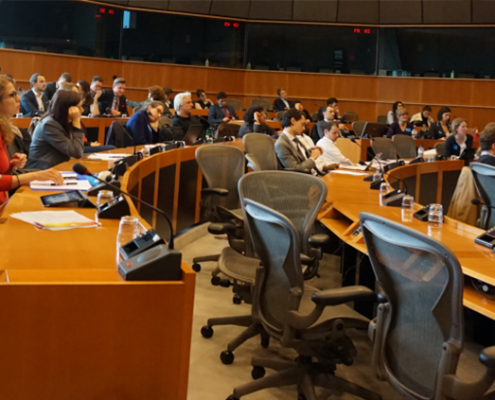Project reference
This project has received funding from the European Union’s Horizon 2020 research and innovation programme under grant agreement No 101021687.

This project has received funding from the European Union’s Horizon 2020 research and innovation programme under grant agreement No 101021687.
In recent years, the criminal use of information hiding techniques (i.e., steganography) in digital media such as images, video, audio and text files has been increasing rapidly. An important reason for this is that many steganographic tools have been made available as program source code packages. Consequently, perpetrators can easily selectively pick, adapt and combine information hiding tools for their criminal activities.
Due to the availabbility of tools, we are observing a significant increase in the use of steganographic methods in typical areas such as cybercrime and malware attacks and campaigns as well as beyond. In preparation of UNCOVER, an initial survey of the Criminal Use of Information Hiding (CUIng) initiative on the Europol Platform for Experts (EPE) reveals that evidence of steganography and related principles has been found in a wide variety of types of crime including child pornography, industrial espionage, criminal attacks on enterprises, credit card fraud and skimming, system intrusion, and backdoor injection and delivery methods.
However, steganographic methods and technologies are a major challenge for Law Enforcement Agencies (LEAs) due to a lack of resources and procedures for investigations or structured operations. These problems are amplified by the increasing amount of digital evidence that LEAs and judicial partners have to handle. UNCOVER therefore aims to address these issues and to further develop steganographic tools in order to establish a tailored toolkit for LEAs.
 https://www.synyo.com/wp-content/uploads/SYNYO-NEWS-featured-image-NEW01003706EN.png
400
459
SYNYO
https://www.synyo.com/wp-content/uploads/2017/09/synyo-logo.png
SYNYO2019-04-05 07:02:482021-08-09 15:58:14EUNOMIA project aims to restore public trust in social media
https://www.synyo.com/wp-content/uploads/SYNYO-NEWS-featured-image-NEW01003706EN.png
400
459
SYNYO
https://www.synyo.com/wp-content/uploads/2017/09/synyo-logo.png
SYNYO2019-04-05 07:02:482021-08-09 15:58:14EUNOMIA project aims to restore public trust in social media https://www.synyo.com/wp-content/uploads/2017/05/ftdm-ep-1-900x423.png
423
900
SYNYO
https://www.synyo.com/wp-content/uploads/2017/09/synyo-logo.png
SYNYO2017-04-03 15:17:462020-12-17 12:40:24Second Workshop. FutureTDM in Brussels
https://www.synyo.com/wp-content/uploads/2017/05/ftdm-ep-1-900x423.png
423
900
SYNYO
https://www.synyo.com/wp-content/uploads/2017/09/synyo-logo.png
SYNYO2017-04-03 15:17:462020-12-17 12:40:24Second Workshop. FutureTDM in Brussels https://www.synyo.com/wp-content/uploads/2017/02/PeaceTraining-01.png
423
900
SYNYO
https://www.synyo.com/wp-content/uploads/2017/09/synyo-logo.png
SYNYO2016-11-21 10:15:002020-12-17 12:41:04PeaceTraining.eu Kick off Meeting
https://www.synyo.com/wp-content/uploads/2017/02/PeaceTraining-01.png
423
900
SYNYO
https://www.synyo.com/wp-content/uploads/2017/09/synyo-logo.png
SYNYO2016-11-21 10:15:002020-12-17 12:41:04PeaceTraining.eu Kick off Meeting https://www.synyo.com/wp-content/uploads/2017/02/FutureTDM-05.png
423
900
SYNYO
https://www.synyo.com/wp-content/uploads/2017/09/synyo-logo.png
SYNYO2016-11-17 08:44:082017-02-17 08:56:58FutureTDM Workshop
https://www.synyo.com/wp-content/uploads/2017/02/FutureTDM-05.png
423
900
SYNYO
https://www.synyo.com/wp-content/uploads/2017/09/synyo-logo.png
SYNYO2016-11-17 08:44:082017-02-17 08:56:58FutureTDM Workshop https://www.synyo.com/wp-content/uploads/2016/09/Banner-article-01.png
423
900
SYNYO
https://www.synyo.com/wp-content/uploads/2017/09/synyo-logo.png
SYNYO2016-09-29 07:53:482017-06-14 07:25:50TDM in the space industry
https://www.synyo.com/wp-content/uploads/2016/09/Banner-article-01.png
423
900
SYNYO
https://www.synyo.com/wp-content/uploads/2017/09/synyo-logo.png
SYNYO2016-09-29 07:53:482017-06-14 07:25:50TDM in the space industry https://www.synyo.com/wp-content/uploads/2017/02/FutureTDM-04.png
423
900
SYNYO
https://www.synyo.com/wp-content/uploads/2017/09/synyo-logo.png
SYNYO2016-08-17 08:31:352017-04-13 09:01:57Actively Blogging on FutureTDM Platform
https://www.synyo.com/wp-content/uploads/2017/02/FutureTDM-04.png
423
900
SYNYO
https://www.synyo.com/wp-content/uploads/2017/09/synyo-logo.png
SYNYO2016-08-17 08:31:352017-04-13 09:01:57Actively Blogging on FutureTDM Platform https://www.synyo.com/wp-content/uploads/2017/02/FutureTDM-03.png
423
900
SYNYO
https://www.synyo.com/wp-content/uploads/2017/09/synyo-logo.png
SYNYO2016-07-17 08:14:382017-04-13 09:02:18Recent dissemination events
https://www.synyo.com/wp-content/uploads/2017/02/FutureTDM-03.png
423
900
SYNYO
https://www.synyo.com/wp-content/uploads/2017/09/synyo-logo.png
SYNYO2016-07-17 08:14:382017-04-13 09:02:18Recent dissemination events https://www.synyo.com/wp-content/uploads/2017/02/FutureTDM-02.png
423
900
SYNYO
https://www.synyo.com/wp-content/uploads/2017/09/synyo-logo.png
SYNYO2016-05-16 16:48:492017-04-13 09:02:36Project meetings with a special guest
https://www.synyo.com/wp-content/uploads/2017/02/FutureTDM-02.png
423
900
SYNYO
https://www.synyo.com/wp-content/uploads/2017/09/synyo-logo.png
SYNYO2016-05-16 16:48:492017-04-13 09:02:36Project meetings with a special guest https://www.synyo.com/wp-content/uploads/2017/02/FutureTDM-01.png
423
900
SYNYO
https://www.synyo.com/wp-content/uploads/2017/09/synyo-logo.png
SYNYO2016-02-16 16:04:172020-12-17 12:41:37FutureTDM Communication Channels
https://www.synyo.com/wp-content/uploads/2017/02/FutureTDM-01.png
423
900
SYNYO
https://www.synyo.com/wp-content/uploads/2017/09/synyo-logo.png
SYNYO2016-02-16 16:04:172020-12-17 12:41:37FutureTDM Communication Channels
 Re-ACT: Introducing the prevention-hub
Re-ACT: Introducing the prevention-hub | Cookie | Duration | Description |
|---|---|---|
| cookielawinfo-checkbox-analytics | 11 months | This cookie is set by GDPR Cookie Consent plugin. The cookie is used to store the user consent for the cookies in the category "Analytics". |
| cookielawinfo-checkbox-functional | 11 months | The cookie is set by GDPR cookie consent to record the user consent for the cookies in the category "Functional". |
| cookielawinfo-checkbox-necessary | 11 months | This cookie is set by GDPR Cookie Consent plugin. The cookies is used to store the user consent for the cookies in the category "Necessary". |
| cookielawinfo-checkbox-others | 11 months | This cookie is set by GDPR Cookie Consent plugin. The cookie is used to store the user consent for the cookies in the category "Other. |
| cookielawinfo-checkbox-performance | 11 months | This cookie is set by GDPR Cookie Consent plugin. The cookie is used to store the user consent for the cookies in the category "Performance". |
| viewed_cookie_policy | 11 months | The cookie is set by the GDPR Cookie Consent plugin and is used to store whether or not user has consented to the use of cookies. It does not store any personal data. |

EUNOMIA
/0 Comments/in EUNOMIA, Projects /by SYNYOA decentralised, intermediary-free and open-source solution for addressing the challenges of information flow in social media and the problem of trustworthiness
IoThreats
/0 Comments/in IoThreats, Projects /by SYNYOIoThreats addresses the increasing vulnerability of a variety of systems in the fields of the Internet of Things (IoT), such as Smart Grid, Connected Car, Industry 4.0, Active and Assisted Living (AAL), Telemedicine and others.
FutureTDM
/0 Comments/in FutureTDM, Projects /by SYNYOReducing Barriers and Increasing Uptake of Text and Data Mining for Research Environments using a Collaborative Knowledge and Open Information Approach